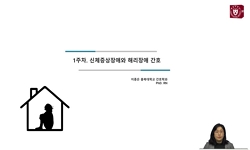이 연구는 정신장애인의 사회통합에 어떤 요인들이 영향을 미치고 있고, 그에 따라 지역사회 정신건강전달체계의 한계점과 정신건강증진시설의 역할을 재정립하여 정신장애인의 사회통합 ...
http://chineseinput.net/에서 pinyin(병음)방식으로 중국어를 변환할 수 있습니다.
변환된 중국어를 복사하여 사용하시면 됩니다.
- 中文 을 입력하시려면 zhongwen을 입력하시고 space를누르시면됩니다.
- 北京 을 입력하시려면 beijing을 입력하시고 space를 누르시면 됩니다.

정신건강전달체계 개편을 통한 정신장애인의 사회통합 증진방안 : 정신건강증진시설의 역할에 관한 전문가 인식을 중심으로 = A Study on Social Integration of the Mentally Disabled through Mental Health Delivery System Reform
한글로보기https://www.riss.kr/link?id=A107936186
- 저자
- 발행기관
- 학술지명
- 권호사항
-
발행연도
2021
-
작성언어
-
- 주제어
-
KDC
338
-
등재정보
KCI등재
-
자료형태
학술저널
-
수록면
133-169(37쪽)
-
KCI 피인용횟수
0
- 제공처
-
0
상세조회 -
0
다운로드
부가정보
국문 초록 (Abstract)
이 연구는 정신장애인의 사회통합에 어떤 요인들이 영향을 미치고 있고, 그에 따라 지역사회 정신건강전달체계의 한계점과 정신건강증진시설의 역할을 재정립하여 정신장애인의 사회통합 증진방안을 제시하는 데 목적을 두고 있다. 이를 위해 정신의학 전문가, 정신건강전문요원, 가족 및 당사자, 지방자치단체 전문가 17명을 대상으로 델파이 조사를 실시하고 질적 자료분석을 하였다. 연구의 주요 결과를 정리하면 첫째, 정신장애인의 사회통합을 저해하는 요인으로는 정부의 사회통합 인프라 구축을 위한 재정투자 부족 문제가 가장 크게 주목받았다. 둘째, 정신장애인의 사회통합을 촉진하는 요인으로는 정부의 정신건강증진사업 수행 의지와 투자 확대 그리고 다양한 복지서비스를 결합한 사회복귀시설의 확충으로 압축되었다. 셋째, 현재 정신건강전달체계의 구조적 한계와 문제점으로 전문가들은 다양한 종류의 정신재활시설의 다양성 부족과 지역편차가 큰 정신건강 관련 예산문제를 중요하게생각하고 있었다. 넷째, 정신장애인의 사회통합증진을 위해 필요한 정신건강증진시설의 역할에 대해서 전문가들은 지역사회 기반 집중사례관리의 확대와 주거복지지원 기능을 갖춘 시설기능 강화를 중요하게 생각하는 것으로나타났다. 이에 따라, 본 연구에서는 정신장애인의 사회통합 증진을 위해 필요하다고 판단되는 정책적 우선순위에 따른 지역사회 정신건강전달체계의재편방안을 논의하고 제언하였다.
다국어 초록 (Multilingual Abstract)
This study aims to analyze limitations of mental health delivery system concerning the social integration for the mentally disabled and to propose the mental health delivery system reform and a new function of community mental health agencies. For thi...
This study aims to analyze limitations of mental health delivery system concerning the social integration for the mentally disabled and to propose the mental health delivery system reform and a new function of community mental health agencies. For this purpose, the Delphi method was utilized and a total of 17 mental health professional representing by psychiatrist, and mental health Specialist, the persons with mental illness and their family. As the main results were shown as follows. Firstly, the most important factor that reduce social integration was insufficient fiscal investment for the establishment of the government s social integration infrastructure. Secondly, it was presented as the most important factor to promote social integration of the mentally disabled were the expansion of the government s investment in community mental health and the establishment of community mental heath rehabilitation facilities combined with various social welfare services. Thirdly, experts pointed out the lack of mental rehabilitation facilities with that various function toward social integration and the community mental health budget problems with large regional differences. Finally, There were top opinions that the role of community mental health facilities have to expand community-based intensive case management and to strengthen facility functions with housing support and social welfare functions. In conclusion, we discussed ways to reform the mental health delivery system according to the policy priorities.
목차 (Table of Contents)
- Ⅰ. 서론 Ⅱ. 이론적 배경 Ⅲ. 연구방법 Ⅳ. 분석결과 Ⅴ. 결론
- Ⅰ. 서론 Ⅱ. 이론적 배경 Ⅲ. 연구방법 Ⅳ. 분석결과 Ⅴ. 결론
참고문헌 (Reference)
1 문용훈, "탈원화를 위한 정신장애인 재활-주거 및 복지서비스 제공체계구축의 방향성과 전략" 29-37, 2017
2 보건복지부, "지역사회 통합돌봄 기본계획(안)" 관계부처 합동 2018
3 서미경, "지각된 낙인이 정신장애인의 삶의 만족과 자아존중감에 미치는 영향" 한국사회복지학회 56 (56): 173-194, 2004
4 중앙정신건강복지사업지원단, "정신질환의 사회경제적 비용" 14 : 2019
5 민소영, "정신장애인의 지역사회통합에 영향을 미치는 요인의 경로분석" 한국정신건강사회복지학회 (33) : 36-68, 2009
6 조윤화, "정신장애인 지역사회통합 지원방안 연구" 한국장애인개발원 2014
7 임혁, "정신장애인 지역사회통합 과정의 우선순위 분석" 사회복지정책실천회 4 (4): 5-38, 2018
8 국가인권위원회, "정신장애인 인권증진을 위한 토론회" 2014
9 중앙정신건강복지사업지원단, "정신사회정신재활시설 현황" 12 : 2019
10 하경희, "정신보건제도의 도입과 토착화에 관한 연구: 정신질환자의 탈원화와 지역사회정신보건을 중심으로" 서울행정학회 30 (30): 197-226, 2019
1 문용훈, "탈원화를 위한 정신장애인 재활-주거 및 복지서비스 제공체계구축의 방향성과 전략" 29-37, 2017
2 보건복지부, "지역사회 통합돌봄 기본계획(안)" 관계부처 합동 2018
3 서미경, "지각된 낙인이 정신장애인의 삶의 만족과 자아존중감에 미치는 영향" 한국사회복지학회 56 (56): 173-194, 2004
4 중앙정신건강복지사업지원단, "정신질환의 사회경제적 비용" 14 : 2019
5 민소영, "정신장애인의 지역사회통합에 영향을 미치는 요인의 경로분석" 한국정신건강사회복지학회 (33) : 36-68, 2009
6 조윤화, "정신장애인 지역사회통합 지원방안 연구" 한국장애인개발원 2014
7 임혁, "정신장애인 지역사회통합 과정의 우선순위 분석" 사회복지정책실천회 4 (4): 5-38, 2018
8 국가인권위원회, "정신장애인 인권증진을 위한 토론회" 2014
9 중앙정신건강복지사업지원단, "정신사회정신재활시설 현황" 12 : 2019
10 하경희, "정신보건제도의 도입과 토착화에 관한 연구: 정신질환자의 탈원화와 지역사회정신보건을 중심으로" 서울행정학회 30 (30): 197-226, 2019
11 성희자, "정신보건법에서의 탈원화과정분석" 사회과학연구소 31 (31): 303-325, 2015
12 국립정신건강센터, "정신건강현황 4차 예비조사 결과보고서" 보건복지부 2018
13 보건복지부, "정신건강종합대책" 국가정책조정회의(관계부처) 2016
14 전진아, "정신건강복지기본계획(2021~2025)수립연구" 한국보건사회연구원 2019
15 한국보건사회연구원, "정신건강복지 기본계획(2021-2025) 수립연구" 2019
16 건강보험정책연구원, "정신건강문제의 사회경제적 영향분석과 관리방안연구-우울증을 중심으로" 건강보험정책연구원 2017
17 최지숙, "정신건강 의료이용의 현황과 과제: 지표 개발과 측정을 통한접근" 2020
18 김문근, "장기입원 정신질환자의 탈시설화를 위한 정신보건전달체계 개편 방안: 정신보건기관 기능개편에 관한 전문가 인식을 중심으로" 한국사회복지정책학회 43 (43): 31-57, 2016
19 보건복지부, "온국민 마음건강 종합대책(제2차 정신건강복지기본계획)" 보건복지부․국정현안점검 조정회의 2021
20 이종성, "델파이 연구방법" 교육과학사 2006
21 노승용, "델파이 기법: 전문적 통찰로 미래 예측하기" 53-62, 2006
22 중앙일보, "국립나주병원, 정신질환자 편견해소 1박2일 병동체험"
23 전준희, "국가정신건강 거버넌스 강화를 위한 필요재원 및 향후 과제" 중앙정신건강사헙지원단 2020
24 국립정신건강센터, "국가 정신건강현황 보고서 2019" 국립정신건강센터 2020
25 Link, G., "Understanding Labeling Effect in the Area of Mental Disorder:An Assessment of the Effects of Expectations of Rejection" 52 : 96-112, 1987
26 Dawson, M., "The Utility of the Delphi Method in MFT Research" 29 : 125-140, 2001
27 Rapp, A., "The Strength model : Case management with people suffering from severe and persistent mental health" Oxford University Press 1998
28 Segal, S., "The Mentally Ill in community-Based Sheltered Care : A study of community care and social integration" John Wily and Sons 1978
29 Hauck, Y., "Research Priorities for Parenting and Child Health: A Delphi Study" 129-139, 2007
30 Hassen, F., "Research Guidelines for the Delphi survey technique" 32 (32): 1008-1015, 2000
31 Anthony, W., "Recovery from mental illness: The guiding vision of the mental health service system in the 1990" 16 (16): 11-13, 1993
32 OECD, "Psychiatric care beds Per 1,000 inhabitants: OECD Health Data"
33 Fennell, P., "Principles of Mental Health Law and Policy" Oxford University Press 2010
34 Prince, N., "Perceived Stigma and Community Integration among Clients of Assertive Community Treatment" 25 (25): 323-331, 2002
35 O’Connor, S., "Mental Health in Korea: OECD Review and Recommendations" 신의진 국회의원실․보건복지부․중앙정신건강복지사업지원단 2013
36 Hall, J., "Mental Health Systems" Thomas Publisher 2006
37 Rogers, A., "Mental Health Policy in Britain" Palgrave Macmillan 2001
38 WHO, "Mental Health Atlas"
39 Manning, S., "Empowerment in Social Work Practice" Brooks/Cole 89-109, 1998
40 Lerman, P., "Deinstitutionalization: A Cross-Problem Analysis" U.S. Department of Health and Human Services 1981
41 Goodwin, S., "Comparative Mental Health Policy" Sage Publication 1997
42 Kruzich, J., "Community Integration of the Mentally III in Residential Facilities" 13 (13): 553-563, 1985
43 Wong, Y., "Community Integration of Persons with Psychiatric Disabilities in supportive Independent Housing: A Conceptual Model and Methodological Considerations" 4 : 13-28, 2002
44 Kennedy, C., "Community Integration and Well-Being : Toward the Goals of Community Care" 45 (45): 65-77, 1989
45 Kunovich, R. M., "Civil War, Social Integration and Mental Health in Croatia" 40 (40): 323-343, 1999
46 Drukker, M., "Can Assertive Community Treatment Remedy Patients Dropping Out of Treatment Due to Fragmented Services?" 50 : 454-459, 2014
47 보건복지부, "2016년도 정신질환 실태조사 보고서" 보건복지부․삼성서울병원 2016
48 보건복지부, "2015 국가 정신건강현황 예비조사 결과보고서" 2015
49 보건복지부, "2011년도 정신질환실태 역학조사 보고서" 보건복지부․국립서울병원 2011
동일학술지(권/호) 다른 논문
-
온종일 돌봄체계 선도사업 지역에 대한 사례연구 : 실무자가 경험한 제도의 분절성을 중심으로
- 사회복지정책실천회
- 박해긍(Park, Hae-keung)
- 2021
- KCI등재
-
- 사회복지정책실천회
- 윤성호(Yoon, Songho)
- 2021
- KCI등재
-
코로나19로 인한 가족의 위기와 가족복지정책의 방향: 위기와 기회
- 사회복지정책실천회
- 박병현(Park, Byung-Hyun)
- 2021
- KCI등재
-
- 사회복지정책실천회
- 최윤정(Choi, Yun-Jung)
- 2021
- KCI등재




 스콜라
스콜라







